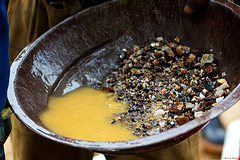
Despite misperceptions recently voiced by some companies, the minerals trade in the Congo is open for business—as long as the minerals are conflict-free. Some companies, such as the Crankset Group co-owned by Chuck Blakeman, are using Section 1502 of the Dodd-Frank Act as a scapegoat, claiming the bill has created an embargo in the trade of specific minerals—tin, tungsten, tantalum, and gold—from the Congo. In reality though, companies can source minerals from the Congo and should capitalize on this opportune time to invest in conflict-free supply chains.
The Dodd-Frank legislation does not ban trade, but instead encourages corporate social responsibility among companies in the U.S. that could potentially be using conflict minerals. The bill requires these companies to uphold supply chain transparency through implementing a process of tracing and auditing minerals that originated in the Congo and surrounding countries. These requirements are necessary to ensure that profits from minerals are not funding armed groups in eastern Congo, thus further fueling a war of intimidation and rape against the local population.
Under Dodd-Frank, the Securities and Exchange Commission, or SEC, is required to create regulations for companies sourcing minerals in the Congo. The SEC regulations are due to be published by December 2011.
In the meantime, companies should comply with the Due Diligence Guidance for Responsible Supply Chains of Minerals from Conflict-Affected and High-Risk adopted by the Organization for Economic Cooperation and Development, or OECD. The guidance was developed last year through a working group of governments, industry, and civil society. It is a set of voluntary standards for companies using minerals from eastern Congo and neighboring countries, which aim to ensure that the minerals are conflict-free. The International Conference on the Great Lakes Region has endorsed the OECD guidance, and the U.N. Security Council supported a similar version of standards that were drafted by the U.N. Group of Experts on Congo. Companies that follow the OECD guidance now should already be in compliance in December when the SEC regulations are finalized.
The OECD’s due diligence guidance offers direction to all involved—from local exporters and mineral processors, to the manufacturing and name-brand company retailers—on how to better identify and manage risks on the supply chain. When creating these regulations, the OECD strived to avoid companies from boycotting mining in the Congo. Deputy Director of the OECD Stephen P. Groff explained:
By incorporating the flexibility to allow trade to continue, it promotes responsible sourcing, bearing in mind that supply chains cannot become 100% conflict-free overnight. In this way, it avoids pull-outs that would have severe consequences for the poor populations that depend on mining.
The Enough Project shares these concerns about local impacts and recognizes that there has been a temporary decline of mining in the Congo during this transitional period. What is key, however, is that the Dodd-Frank legislation presses companies to ensure they are investing in peaceful development and livelihoods that over the long-term will have a significantly positive impact on the ground. The legislation and advocacy that has supported it does not downplay the suffering that has taken place on the ground, but in the long run, companies adhering to the OECD standards will help to invest in the future of the Congo through a sustainable, conflict-free mineral trade..
Further misperceptions created by industry lobbyists around the OECD guidance suggest that companies cannot export minerals from the Congo due to a lack of buyers, as a direct result of the Dodd-Frank legislation. On the contrary, as long as minerals sourced from the Congo are conflict-free there are buyers who are willing and able to purchase them.
Case in point, Motorola Solutions became the first company to invest in a Congolese conflict-free supply chain, through the Solutions for Hope Project in July 2011. It is a pilot initiative that sources conflict-free tantalum from the Congo to be used in Motorola Solutions products by using a closed-pipe supply line, with all suppliers—mine, exporter, processor, component manufacturer, and end user —identified in advance. This enables the company to still source minerals from the Congo and support local artisanal miners, while ensuring that consumers are purchasing a conflict-free product. In September 2011, Hewlett-Packard, or HP, and Intel also joined the initiative. Further transparency and regular independent monitoring would improve the project, but it is an encouraging first step and will produce valuable lessons for future initiatives.
In the Kivus of eastern Congo, a multi-stakeholder group is beginning to make progress toward conflict-free sourcing. A team made up of the Congolese government, industry, the U.N. Group of Experts, and one civil society group recently assessed the conflict and labor standards of 60 mines in the area and will publish a report validating some of these mines. This process is still underway, but it should help bring further conflict-free investment into the Kivus.
Another step that companies can take to responsibly source from the Congo is to sign on to the Public Private Alliance on conflict-free sourcing, a partnership between the U.S. government, industry, and NGOs. The alliance will invest in the tracing and auditing systems in the Kivus—such as bagging and tagging, and monitoring—which are needed to source conflict-free minerals. The Enough Project signed on to the alliance last week, along with 11 companies so far.
The bottom line is that the OECD due diligence guidance and the Dodd-Frank bill are not anti-business but are in support of socially responsible trade. Conflict-free supply chains, such as Motorola’s Solutions for Hope Project, can provide a new wave of investment in the Congo that would support local communities versus armed groups. And although the Dodd-Frank bill is not the end-all-be-all solution to the conflict in the Congo, it is a significant piece of the puzzle that provides tangible steps for companies to take to invest in long-term development and sustainable livelihoods in Congo.
Photo: Tin ore in the Congo (Sasha Lezhnev / Enough Project)

